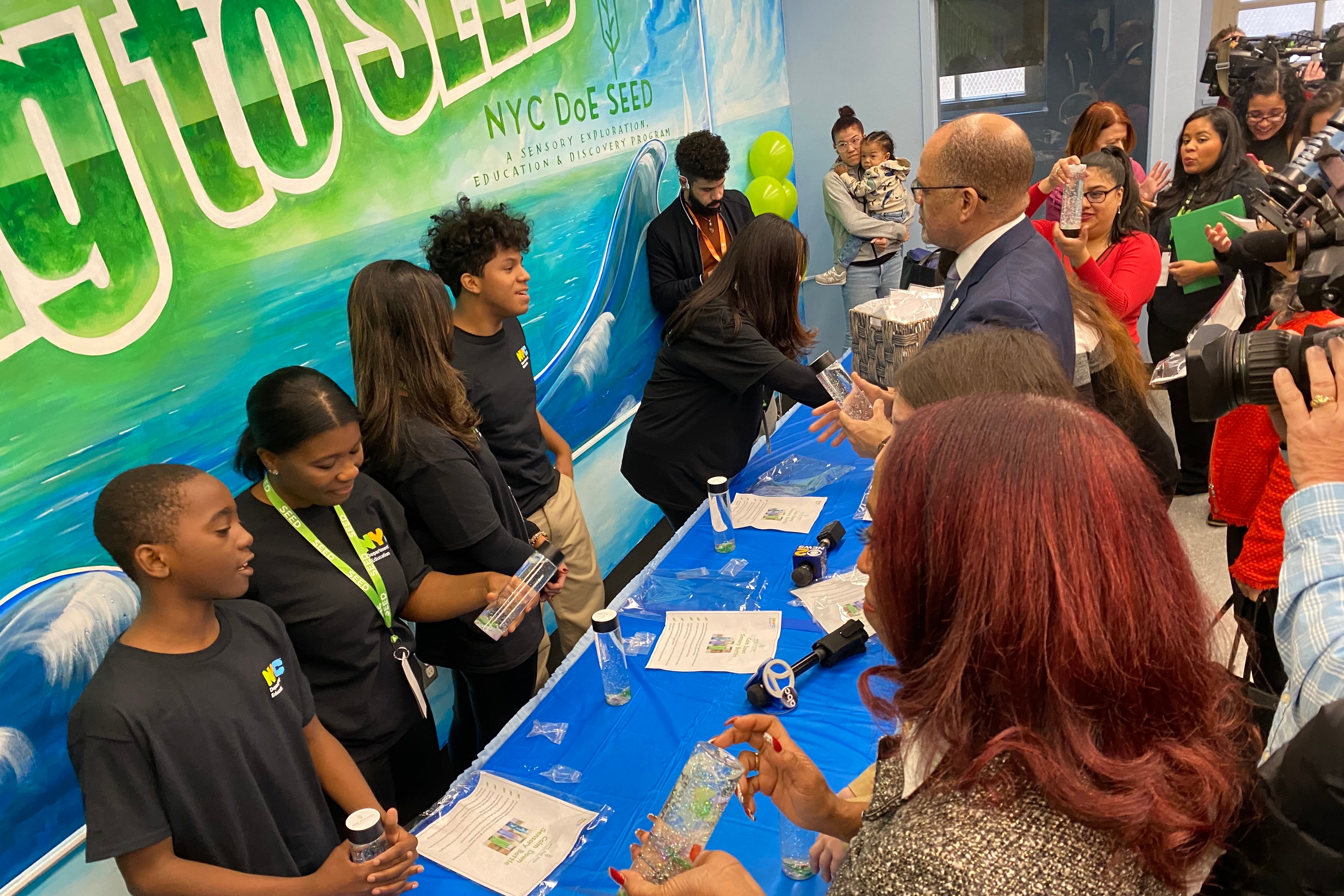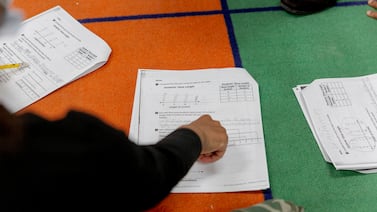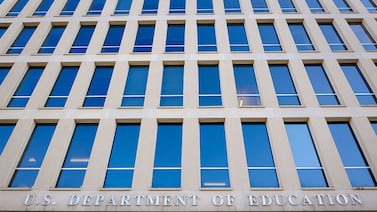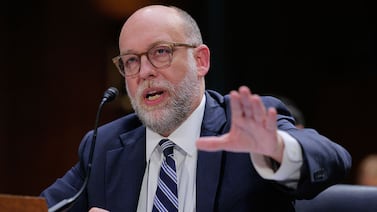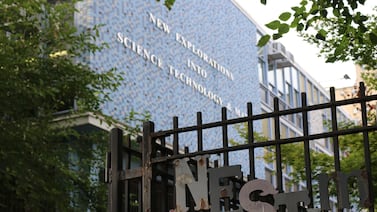New York City’s Education Department has quietly been asking leaders of District 75 schools serving students with complex disabilities to slash tens of millions of dollars from their budgets, according to staffers at multiple schools.
The cuts, relayed to principals by schools Chancellor David Banks and District 75 superintendent Ketler Louissant, amount in many cases to more than $1 million per school, and are supposed to take effect immediately, according to staff from multiple affected schools. Across the district, they total about $97 million, and are supposed to help the Education Department achieve savings ordered by Mayor Eric Adams, people familiar with the discussions said.
The cuts would gut extracurricular programming, thin out supply budgets, and exacerbate an already severe paraprofessional shortage, potentially pushing schools even further out of compliance with students’ legally binding special education plans, staffers from four District 75 schools told Chalkbeat.
The roughly 26,000 students in District 75 often have complex disabilities that their local public schools are unable to accommodate, ranging from cerebral palsy to acute emotional challenges.
“They’re asking every principal in District 75 to cut close to $1 million from their budgets,” said a District 75 administrator, who spoke on the condition of anonymity for fear of retaliation. “There will be no paper or ink for the printers … children that are emotionally disturbed, autistic, will not be able to get a paraprofessional.”
Education Department officials didn’t confirm the amount of the cuts. But department spokesperson Nathaniel Styer said, “We are in a fiscal crisis, and we are taking every action necessary to limit impact on schools.”
District 75 schools are undergoing a normal process of “reconcil[ing] enrollment with the number of classes needed to serve students,” he said. “Additionally, we are identifying vacancies, efficiencies, and underspending that can be used to meet the mayor’s savings target.”
But staff at District 75 schools said the steep midyear cuts are not typical. District 75 schools don’t get money through the Fair Student Funding formula used for other public schools and aren’t normally subject to “midyear adjustments” that require schools to give back money part way through the year if their enrollments are lower than projected, staffers said.
Moreover, the district’s enrollment has actually gone up in recent years, even as student numbers have cratered in much of the rest of the city. Enrollment in District 75 rose 3% between 2018-2019 and last school year, while K-12 schools lost 13% of their students citywide during the same period.
“We have so many students with referrals waiting for a new seat,” said Tameka Solomon, a teacher and union chapter leader at P352X in the Bronx.
District 75 cuts are larger than anticipated
The cuts far exceed what was outlined in the city’s November budget plan, which listed “savings” of $3 million a year in District 75 because of “lower than expected spending.” When City Councilmember Alexa Avilés, of Brooklyn, asked about a $97 million cut to District 75 during an oversight hearing last week, Mayor’s Office of Management and Budget Director Jacques Jiha pointed only to the $3 million cut outlined in budget documents.
But behind the scenes, the message from Education Department officials has been much different, educators said.
Solomon’s principal was asked to cut $1.3 million from the school’s budget, though subsequently the principal said the cut was on hold, she said.
The Bronx’s P186X, which is the city’s largest District 75 program with nearly 700 students, is also facing a $1.3 million midyear cut, according to teacher and chapter leader Jo Macellaro.
Many District 75 schools have already begun trimming overtime budgets that pay teachers to staff extracurricular programs and budgets for supplies, multiple staffers said. Those cuts are less painful than eliminating staff positions, but they still affect kids, staffers said.
“Even during COVID we always had an afterschool program, and now it’s like, ‘Don’t even think about it,’”said Allister Johnson, an adaptive physical education teacher and union chapter leader at a District 75 school.
“A lot of learning took place,” in the extracurricular programs, he added. “It’s sad for the kids and for the parents.”
Concerns grow over paraprofessional shortage
Reducing overtime and supplies budgets won’t be enough to achieve the required savings, however. Schools will likely have to slash the budgets for paraprofessionals, teaching assistants who provide extra support for students with the greatest needs, staffers said.
District 75 schools have already been experiencing a severe paraprofessional shortage.
The number of paraprofessionals working in city schools fell from roughly 25,700 in June 2020 to about 21,800 in November 2021, according to the state comptroller, a drop of roughly 15%.
As a result, many students with significant disabilities whose special education plans require a dedicated, one-to-one paraprofessional go without one, staffers said.
P186X is already short at least 30 paraprofessionals, according to Macellaro. On some days, one paraprofessional has to change the diapers of a dozen middle school students alone.
“People are getting injured. It’s already really not a good situation. And honestly we’re already rationing things like wipes,” Macellaro added.
Solomon’s school has largely been relying on substitute paraprofessionals. It’s better than nothing, but it often means investing extra time training people who may have never worked with kids, and less continuity for students who have to work with a rotating array of paraprofessionals, she said.
Further cutting the already diminished paraprofessional pool could have disastrous consequences, staffers said.
The District 75 administrator said their school has a number of students with autism who will attempt to run out of their classrooms and the school building with no warning. “Think about what’s going to happen” when those students don’t have a dedicated paraprofessional to follow them throughout the day, the administrator said.
An Education Department spokesperson acknowledged there is a paraprofessional shortage, but attributed it to “lack of talent,” not “lack of funds.”
The budget cuts laid out in November, which amount to 5% from each agency, include roughly $550 million from the Education Department. Additional 5% cuts are expected in January and again in the spring.
Among the Education Department cuts are $10 million from the community schools program, which pairs schools with community organizations to provide additional services to families, and $20 million from the city’s free summer school program.
But the cuts to District 75 appear to be the deepest so far to individual school budgets — a fact that’s baffled the District 75 administrator: “How do you justify asking the most vulnerable children in the city to go without?”
Michael Elsen-Rooney is a reporter for Chalkbeat New York, covering NYC public schools. Contact Michael at melsen-rooney@chalkbeat.org.

